
The North Atlantic Treaty Organization, also called the North Atlantic Alliance, is an intergovernmental military alliance of 32 member states—30 European and 2 North American. Established in the aftermath of World War II, the organization implements the North Atlantic Treaty, signed in Washington, D.C., on 4 April 1949. NATO is a collective security system: its independent member states agree to defend each other against attacks by third parties. During the Cold War, NATO operated as a check on the threat posed by the Soviet Union. The alliance remained in place after the dissolution of the Soviet Union and the Warsaw Pact, and has been involved in military operations in the Balkans, the Middle East, South Asia, and Africa. The organization's motto is animus in consulendo liber. The organization's strategic concepts include deterrence.
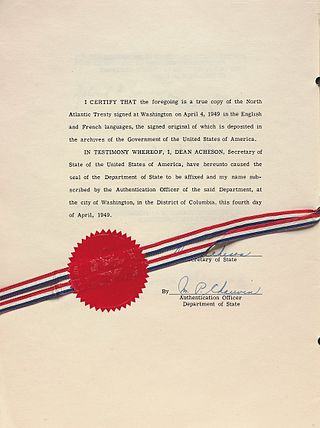
The North Atlantic Treaty, also known as the Washington Treaty, forms the legal basis of, and is implemented by, the North Atlantic Treaty Organization (NATO). The treaty was signed in Washington, D.C., on 4 April 1949.

The Partnership for Peace is a North Atlantic Treaty Organization (NATO) program aimed at creating trust and cooperation between the member states of NATO and other states mostly in Europe, including post-Soviet states; 18 states are members. The program contains 6 areas of cooperation, which aims to build relationships with partners through military-to-military cooperation on training, exercises, disaster planning and response, science and environmental issues, professionalization, policy planning, and relations with civilian government. During policy negotiations in the 1990s, a primary controversy regarding PfP was its ability to be interpreted as a program that is a stepping stone for joining NATO with full Article 5 guarantees.

A major non-NATO ally (MNNA) is a designation given by the United States government to countries that have strategic working relationships with the U.S. Armed Forces while not being members of the North Atlantic Treaty Organization (NATO). While the status does not automatically constitute a mutual defense pact with the United States, it does confer a variety of military and financial advantages that are otherwise unobtainable by non-NATO countries. There are currently 20 major non-NATO allies across four continents: 11 in Asia, 4 in Africa, 3 in South America, and 2 in Oceania.

International relations between the European Union (EU) and Ukraine are shaped through the Ukraine–European Union Association Agreement and the Deep and Comprehensive Free Trade Area (DCFTA). Ukraine is a priority partner within the Eastern Partnership and the European Neighbourhood Policy (ENP). The EU and Ukraine developed an increasingly close relationship, going beyond co-operation, to gradual economic integration and deepening of political co-operation. On 23 June 2022, the European Council granted Ukraine the status of a candidate for accession to the European Union.
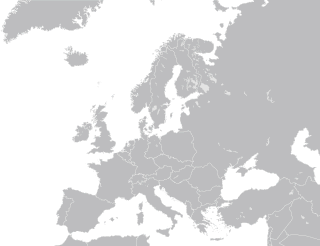
NATO is a military alliance of thirty-two European and North American countries that constitutes a system of collective defense. The process of joining the alliance is governed by Article 10 of the North Atlantic Treaty, which allows for the invitation of "other European States" only and by subsequent agreements. Countries wishing to join must meet certain requirements and complete a multi-step process involving political dialogue and military integration. The accession process is overseen by the North Atlantic Council, NATO's governing body. NATO was formed in 1949 with twelve founding members and has added new members ten times. The first additions were Greece and Turkey in 1952. In May 1955, West Germany joined NATO, which was one of the conditions agreed to as part of the end of the country's occupation by France, the United Kingdom, and the United States, prompting the Soviet Union to form its own collective security alliance later that month. Following the end of the Franco regime, newly democratic Spain chose to join NATO in 1982.
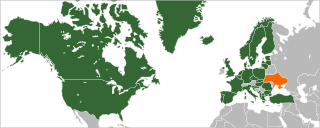
Relations between Ukraine and the North Atlantic Treaty Organization (NATO) started in 1991 following Ukraine's independence after the dissolution of the Soviet Union. Ukraine-NATO ties gradually strengthened during the 1990s and 2000s, and Ukraine aimed to eventually join the alliance. Although co-operating with NATO, Ukraine remained a neutral country. After it was attacked by Russia in 2014, Ukraine has increasingly sought NATO membership.
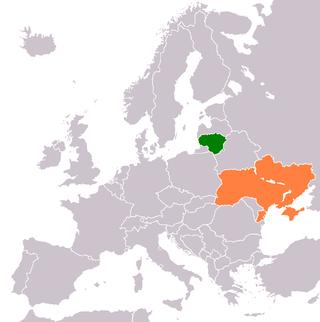
Lithuania–Ukraine relations are foreign relations between Lithuania and Ukraine. Both countries are members of the Lublin Triangle, OSCE, Council of Europe, World Trade Organization and United Nations. Lithuania supports Ukraine's European Union and NATO membership. Lithuania has an embassy in Kyiv and Ukraine has an embassy in Vilnius.
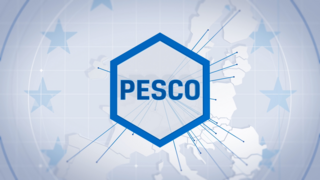
The Permanent Structured Cooperation (PESCO) is the part of the European Union's (EU) security and defence policy (CSDP) in which 26 of the 27 national armed forces pursue structural integration. Based on Article 42(6) and Protocol 10 of the Treaty on European Union, introduced by the Treaty of Lisbon in 2009, PESCO was initiated in 2017. The integration into PESCO is through projects which launched in 2018.

On 28 February 2022, four days after it was invaded by Russia, Ukraine applied for membership of the European Union (EU). Ukrainian President Volodymyr Zelenskyy requested immediate admission under a "new special procedure", and the presidents of eight EU states called for an accelerated accession process. European Commission president Ursula von der Leyen stated that she supports Ukrainian accession, but that the process would take time. On 10 March 2022, the Council of the European Union asked the commission for its opinion on the application. On 8 April 2022, von der Leyen presented Zelenskyy with a legislative questionnaire, which Ukraine responded to on 9 May.
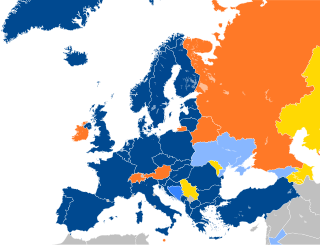
NATO maintains foreign relations with many non-member countries across the globe. NATO runs a number of programs which provide a framework for the partnerships between itself and these non-member nations, typically based on that country's location. These include the Euro-Atlantic Partnership Council and the Partnership for Peace.

The Lublin Triangle is a regional alliance of three European countries – Lithuania, Poland, and Ukraine – for the purposes of strengthening mutual military, cultural, economic and political cooperation and supporting Ukraine's integration into the European Union and NATO. The Lublin Triangle initiative invokes the integrative heritage of the 1569 Union of Lublin.

The Bucharest Nine or the Bucharest Format is an organization founded on 4 November 2015 in Bucharest, Romania, at the initiative of the President of Romania Klaus Iohannis and the President of Poland Andrzej Duda during a bilateral meeting between them. Its members are Bulgaria, the Czech Republic, Estonia, Hungary, Latvia, Lithuania, Poland, Romania and Slovakia. Its appearance was mainly a result of a perceived aggressive attitude from Russia following the annexation of Crimea from Ukraine and its posterior intervention in eastern Ukraine both in 2014. All members of the B9 were either part of the former Soviet Union (USSR) or members of the defunct Soviet-led Warsaw Pact.
There have been several rounds of peace talks to halt the Russian invasion of Ukraine (2022–present) and end the Russo-Ukrainian War (2014–present) in an armistice. The first meeting was held four days after the start of the invasion, on 28 February 2022, in Belarus. It concluded without result, with delegations from both sides returning to their capitals for consultations. A second and third round of talks took place on 3 and 7 March 2022, on the Belarus–Ukraine border, in an undisclosed location in the Gomel region of Belarus. A fourth and fifth round of talks were respectively held on 10 and 14 March in Antalya, Turkey.

Armenia and the North Atlantic Treaty Organization (NATO) have maintained a formal relationship since 1992, when Armenia joined the North Atlantic Cooperation Council. Armenia officially established bilateral relations with NATO in 1994 when it became a member of NATO's Partnership for Peace (PfP) programme. In 2002, Armenia became an Associate Member of the NATO Parliamentary Assembly.

The Ramstein Air Base meeting was an international conference organized by the United States that took place on 26 April 2022 at the Ramstein Air Base in Germany. The purpose of the meeting was to discuss the Russian invasion of Ukraine, particularly Ukrainian defense capabilities, as well as pledge and coordinate further support to Ukraine – including after the war. Representatives and senior defense officials from more than 40 nations attended, the majority of them NATO and EU members, but also including countries in Africa and Asia.
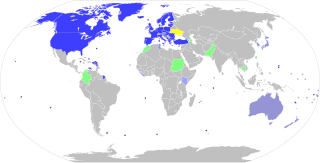
The Ukraine Defense Contact Group is an alliance of 57 countries and the European Union supporting the defence of Ukraine by sending military equipment in response to the 2022 Russian invasion. The group coordinates the ongoing donation of military aid at monthly meetings. A first meeting took place between 41 countries on 26 April 2022, and the coalition comprised 54 countries at the time of the 14 February 2023 meeting. As of November 2023 reports of meetings usually state "more than 50" or "about 50" members.

The 2023 Vilnius summit was the 32nd formal meeting of the heads of state and heads of government of the thirty-one members of the North Atlantic Treaty Organization (NATO), their partner countries, and the European Union, held in Vilnius, Lithuania, on 11–12 July 2023. The summit was officially proposed during the previous 2022 Madrid summit and its dates were fixed on 9 November 2022. It was notable for the discussions about the ongoing Russian invasion of Ukraine as well as Sweden and Ukraine's prospective memberships into the alliance.

The F-16 training coalition is an international coalition formed on 11 July 2023 during the Vilnius Summit with the task of training F-16 pilots, technicians, and support personnel for the Ukrainian Air Force. It originally consisted of 11 nations: Denmark, the Netherlands, Belgium, Canada, Luxembourg, Norway, Poland, Portugal, Romania, Sweden, and the United Kingdom, as well as Ukraine. The group was nicknamed the "Ocean's 11" by Ukrainian Minister of Defence Oleksii Reznikov, in reference to the American film Ocean's Eleven. On 22 August, it was announced that Greece had also joined the coalition, while on 24 August, the United States announced it joined the training efforts as well.

The 2024 Washington summit was the 33rd summit of the heads of state and government of the thirty-two members of the North Atlantic Treaty Organization (NATO), their partner countries and the European Union (EU), which took place in Washington, D.C., United States, on 9–11 July 2024. The summit commemorates the landmark 75th anniversary of NATO, which was founded on 4 April 1949 with the signing of the North Atlantic Treaty in Washington, DC. The summit was also the fourth NATO summit to be held in the United States following the 1978 Washington summit, 1999 Washington summit and 2012 Chicago summit. It also marks the first summit since Sweden acceded to NATO and the last for Jens Stoltenberg as Secretary General.

















